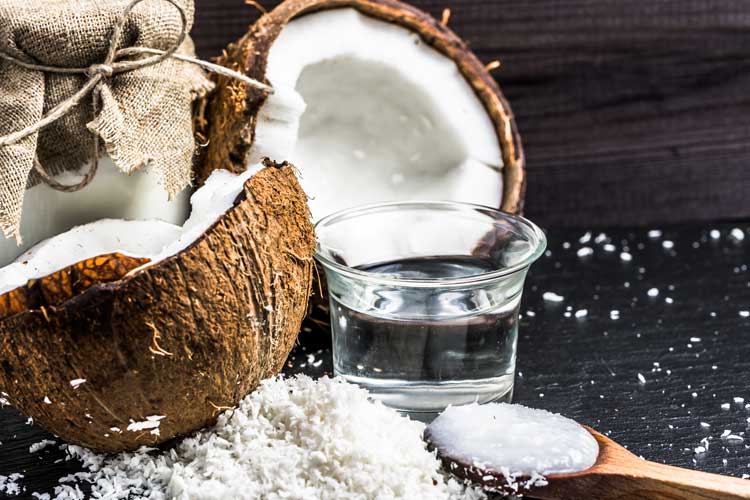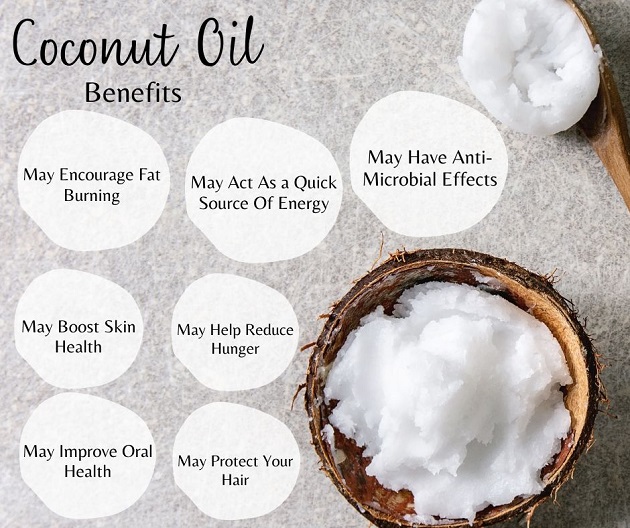
Top 8 Coconut Oil Benefits
For the past few years, Coconut Oil Benefits is a widely searched topic, let’s know about coconut oil benefits in detail. Coconut oil is extracted from the kernel or seeds of matured coconuts harvested from the coconut palm and is a rich source of Saturated Fats.
Coconut oil is a common edible oil in certain countries namely the Philippines, India, China, Vietnam, USA & Malaysia but also there is a controversy regarding its effects on lipid profiles and cardiovascular disease risk.
The high content of SFA (Saturated Fatty Acid) raised concerns that it could lead to more atherogenic lipid profiles, and thus, health professionals in the 1980s recommended that coconut oil should not be used.
This has changed, however, as it was noted that countries with high intake of tropical oils had some of the lowest rates of cardiovascular heart disease, and recently, the use of coconut oil has become more popular because of the potential cardiovascular benefits.
Types of Coconut Oil:
Based on the method of oil extraction from Coconut Kernel, Coconut Oil has been categories broadly Categorised into 3 major categories
Cold Pressed Coconut Oil:
This method is used since ancient times and is one of the simple methods of oil Extraction where Sun Dried Coconut Seeds or Copra are pressed in Wooden Ghaani (That’s why also known as Wood Pressed Oil ) operated at a constant slow speed (Low RPM).
Earlier in technological advancement, OX Power was used to run these wooden ghanis, but Now, OX Power is replaced by Electric Motor Power. In this process heat produced is below 45 degrees Celsius.
Coconut Oil produced by the cold-pressed oil method is unfiltered, unfiltered and Chemical Free as no bleach or any chemical is used to produce the oil and the Natural Sedimentation Filtration process is used to filter the oil.
In simple words, this type of Coconut oil is produced with minimal Human intervention, is untouched, natural & has the highest nutritional values & health benefits
Virgin Coconut Oil:
Virgin coconut oil is made from Fresh Coconut Milk (not sun-dried) There are many extraction methods, among which cold and hot extraction are conventional extraction processes.
The hot extractions are carried out by pressing the clean, ground and fresh coconut, to yield coconut milk followed by heating at high temperatures that could remove the useful micronutrient.
In the cold process, extraction of coconut oil takes place through the destabilization of coconut milk emulsion without heating such as fermentation, chilling and thawing, centrifugation, or enzymatic treatment.
Refined Coconut Oil:
Refined coconut oil is oil that has been further refined and processed after extraction from the coconut. It is also known as RBD oil since it is refined, bleached and deodorized.
During the extraction of the coconut, chemical solvents and high heat are used. The dried coconut is cleaned, ground down, steamed and heated to temperatures over 204o It is then filtered through clay, and sodium hydroxide is added to remove free fatty acids and thus extend shelf-life.
Cold Pressed Coconut Oil Nutrition Facts:
Edible Coconut Oil (Nariyal Ka Tel in the Hindi language) has many nutrients that can contribute to your health. It is full of Fatty Acids that our body needs & may help to improve cognitive function, metabolism, and hair & skin health.
Nutrition Information:-
One Serving of Virgin Cold Pressed Coconut Oil (1 tablespoon) contains the following:
- Calories: 117
- Total Fat: 14 grams
- Saturated Fat: 12 grams
- Trans Fat: 0 grams
- Cholesterol: 0 grams
- Sodium: o grams
- Total Carbohydrates: 0 grams
- Protein: 0 grams
In addition to above mentioned nutritional values, the following essential nutrients & minerals are also found in Coconut Oil
- Lauric Acid
- Myristic Acid
- Palmitic Acid
- Mono-unsaturated Fats
- Poly-unsaturated Fats
- Plant Sterols
- Medium Chain Triglycerides (MCTs)
Coconut Oil Benefits:

Top 8 Coconut Oil Benefits as a food supplement and if applied topically
Coconut oil is an increasingly popular cooking oil. Many people praise it because coconut oil benefits are established after long research and studies and decades of expert debates and claims, including antimicrobial and antioxidant properties, improved skin and oral health, and weight loss potential.
Based on research & studies conducted by various agencies & research firms, the following are the direct & indirect health benefits associated with consuming Coconut oil in our daily diet.
May Encourage Fat Burning:
One of the top coconut oil benefits; Coconut oil is a rich source of medium-chain triglycerides (MCTs), a type of saturated fat, Scientists are studying medium-chain triglycerides (MCTs), including those found in coconut oil, for their potential health benefits.
For instance, some evidence shows that consuming MCTs may increase the number of calories your body burns. Doing so may help promote weight loss. Since the fats in coconut oil are 65% MCT, they may have fat-burning properties that are similar to pure MCT oil.
May Act As a Quick Source Of Energy:
The MCTs in coconut oil provide a quick supply of energy. When you eat long-chain triglycerides (LCTs), the fat molecules are transported through your blood to tissues that need them, such as muscle or fat tissue.
On the other hand, MCTs go straight to your liver and become a rapid energy supply in much the same way as carbs — your body’s preferred source of energy, in fact, MCTs have been long used in sports nutrition products for athletes who need a source of energy their body can absorb and use fast.
May Have Anti-Microbial Effects:
Coconut oil has antimicrobial and antifungal properties due to its MCT content — specifically, lauric acid. Lauric acid is a fatty acid that makes up about 50% of the MCTs in coconut oil. Research suggests it may have antimicrobial effects against disease-causing microorganisms, such as:
- Staphylococcus aureus
- Streptococcus mutans
- Streptococcus pyogenes
- Escherichia coli
- Helicobacter pylori
Studies show that lauric acid may act as a bacteriostatic agent. This is a substance that prevents bacteria from multiplying without killing the bacteria. It may also act as a bactericidal agent, which destroys some bacteria
May Help Reduce Hunger:
One interesting feature of MCTs is that they may help reduce food intake. This may be related to how the body breaks them down. A proportion of MCTs you eat is broken down in a process that produces molecules called ketones.
Ketones reduce appetite by either acting directly on the brain’s chemical messengers or altering the levels of hunger-inducing hormones, such as ghrelin. People on keto diets don’t eat many carbs, but they often eat lots of fat. For this reason, their bodies tend to use ketones for fuel.
May Boost Skin Health:
Studies show that coconut oil can boost the moisture content of dry skin. It may also improve the function of the skin, helping prevent excessive water loss and protecting you from external factors, such as infectious agents, chemicals, and allergens.
In fact, a recent study determined that applying 6–8 drops of virgin coconut oil on your hands and leaving it overnight may be an effective way to prevent dry skin caused by the frequent use of alcohol-based hand sanitisers.
May Protect Your Hair:
For instance, one study determined that, since coconut oil profoundly penetrates hair strands, it makes them more flexible and increases their strength to prevent them from breaking under tension. Similarly, another study found that coconut oil nourishes hair strands and reduces breakage, which further strengthens the hair.
Coconut Oil Hair Mask:
Recent Studies and research have concluded that saturated fat like coconut Oil diffuses into the hair much better than polyunsaturated fats thus helping in reducing the amount of water the hair absorbs.
Hence, Coconut Oil Hair Mask prevents the hair from repeatedly swelling and drying out, which results in hair damage. Coconut Oil Hair Mask can fill the gap between the cuticle cells and also stop chemicals in shampoos from penetrating the follicle.
Studies concluded that coconut is the only oil that reduced protein loss compared to sunflower oil and mineral oil in older on both damaged and undamaged hair.
Coconut oil has the main fatty acid lauric acid, and this has a high affinity for hair protein because of its low molecular weight and straight linear chain.
May Improve Oral Health:
Evidence shows that using coconut oil as a mouthwash, a process called “Oil Pulling” benefits oral hygiene in a cost-effective way. Oil pulling involves swishing coconut oil in your mouth like mouthwash.
It may significantly reduce the count of harmful bacteria in the mouth. Additionally, the lauric acid in coconut oil reacts with saliva to form a soap-like substance that prevents cavities and helps reduce dental plaque build-up and gum inflammation.
Conclusion:
Over the last few years, Domestic consumption of coconut oil has increased as edible oil or for cosmetic purposes. Now the question comes, which type of Coconut Oil should be used? Virgin Cold Pressed Coconut Oil or Refined Coconut Oil?
The simple answer to this question is that you should opt for cold pressed oil as these types of oil retains the natural aroma, taste & nutrients while refined oil has altered taste, aroma and texture and thus has fewer health benefits in comparison to naturally prepared Virgin Cold Pressed Coconut Oil.
You may have to pay some extra cost for Cold Pressed Coconut Oil as compared to refined coconut oil but cold-pressed coconut oil benefits are incomparable with refined coconut oil.

[…] to Ayurvedic Practitioners, any pure cold-pressed cooking oil, especially Cold Pressed Coconut Oil or Cold Pressed Sesame Oil are best suitable for performing the Oil Pulling […]